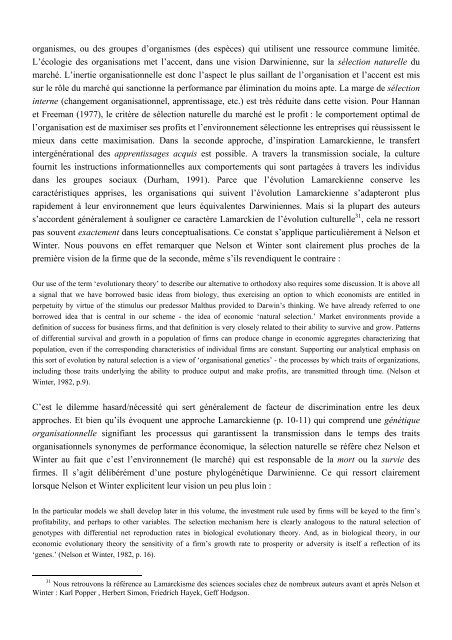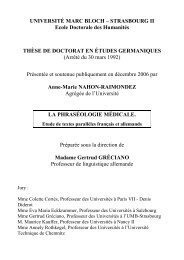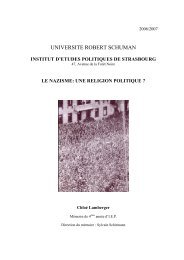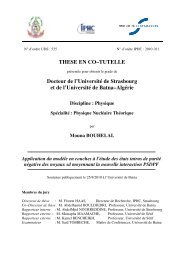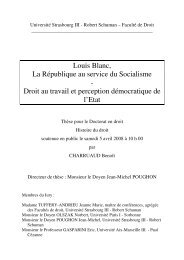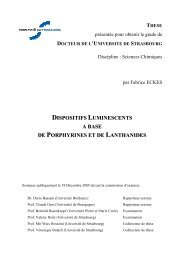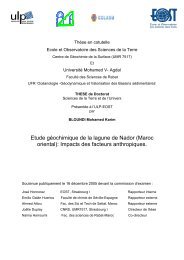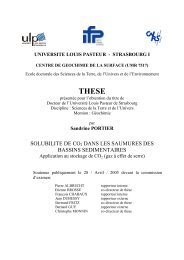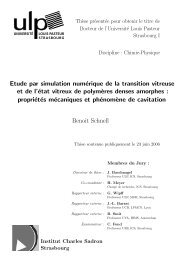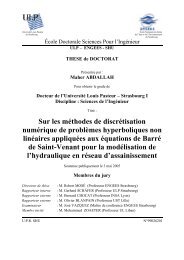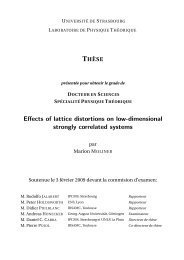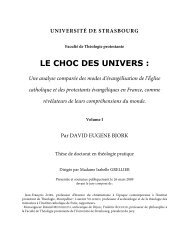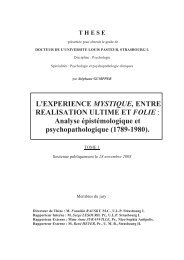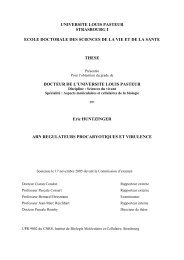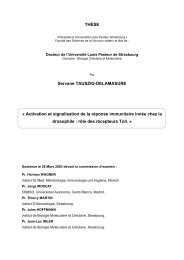Économie Évolutionniste et Culture d'Entreprise
Économie Évolutionniste et Culture d'Entreprise
Économie Évolutionniste et Culture d'Entreprise
You also want an ePaper? Increase the reach of your titles
YUMPU automatically turns print PDFs into web optimized ePapers that Google loves.
organismes, ou des groupes d’organismes (des espèces) qui utilisent une ressource commune limitée.<br />
L’écologie des organisations m<strong>et</strong> l’accent, dans une vision Darwinienne, sur la sélection naturelle du<br />
marché. L’inertie organisationnelle est donc l’aspect le plus saillant de l’organisation <strong>et</strong> l’accent est mis<br />
sur le rôle du marché qui sanctionne la performance par élimination du moins apte. La marge de sélection<br />
interne (changement organisationnel, apprentissage, <strong>et</strong>c.) est très réduite dans c<strong>et</strong>te vision. Pour Hannan<br />
<strong>et</strong> Freeman (1977), le critère de sélection naturelle du marché est le profit : le comportement optimal de<br />
l’organisation est de maximiser ses profits <strong>et</strong> l’environnement sélectionne les entreprises qui réussissent le<br />
mieux dans c<strong>et</strong>te maximisation. Dans la seconde approche, d’inspiration Lamarckienne, le transfert<br />
intergénérational des apprentissages acquis est possible. A travers la transmission sociale, la culture<br />
fournit les instructions informationnelles aux comportements qui sont partagées à travers les individus<br />
dans les groupes sociaux (Durham, 1991). Parce que l’évolution Lamarckienne conserve les<br />
caractéristiques apprises, les organisations qui suivent l’évolution Lamarckienne s’adapteront plus<br />
rapidement à leur environnement que leurs équivalentes Darwiniennes. Mais si la plupart des auteurs<br />
s’accordent généralement à souligner ce caractère Lamarckien de l’évolution culturelle 31 , cela ne ressort<br />
pas souvent exactement dans leurs conceptualisations. Ce constat s’applique particulièrement à Nelson <strong>et</strong><br />
Winter. Nous pouvons en eff<strong>et</strong> remarquer que Nelson <strong>et</strong> Winter sont clairement plus proches de la<br />
première vision de la firme que de la seconde, même s’ils revendiquent le contraire :<br />
Our use of the term ‘evolutionary theory’ to describe our alternative to orthodoxy also requires some discussion. It is above all<br />
a signal that we have borrowed basic ideas from biology, thus exercising an option to which economists are entitled in<br />
perp<strong>et</strong>uity by virtue of the stimulus our predessor Malthus provided to Darwin’s thinking. We have already referred to one<br />
borrowed idea that is central in our scheme - the idea of economic ‘natural selection.’ Mark<strong>et</strong> environments provide a<br />
definition of success for business firms, and that definition is very closely related to their ability to survive and grow. Patterns<br />
of differential survival and growth in a population of firms can produce change in economic aggregates characterizing that<br />
population, even if the corresponding characteristics of individual firms are constant. Supporting our analytical emphasis on<br />
this sort of evolution by natural selection is a view of ‘organisational gen<strong>et</strong>ics’ - the processes by which traits of organizations,<br />
including those traits underlying the ability to produce output and make profits, are transmitted through time. (Nelson <strong>et</strong><br />
Winter, 1982, p.9).<br />
C’est le dilemme hasard/nécessité qui sert généralement de facteur de discrimination entre les deux<br />
approches. Et bien qu’ils évoquent une approche Lamarckienne (p. 10-11) qui comprend une génétique<br />
organisationnelle signifiant les processus qui garantissent la transmission dans le temps des traits<br />
organisationnels synonymes de performance économique, la sélection naturelle se réfère chez Nelson <strong>et</strong><br />
Winter au fait que c’est l’environnement (le marché) qui est responsable de la mort ou la survie des<br />
firmes. Il s’agit délibérément d’une posture phylogénétique Darwinienne. Ce qui ressort clairement<br />
lorsque Nelson <strong>et</strong> Winter explicitent leur vision un peu plus loin :<br />
In the particular models we shall develop later in this volume, the investment rule used by firms will be keyed to the firm’s<br />
profitability, and perhaps to other variables. The selection mechanism here is clearly analogous to the natural selection of<br />
genotypes with differential n<strong>et</strong> reproduction rates in biological evolutionary theory. And, as in biological theory, in our<br />
economic evolutionary theory the sensitivity of a firm’s growth rate to prosperity or adversity is itself a reflection of its<br />
‘genes.’ (Nelson <strong>et</strong> Winter, 1982, p. 16).<br />
31 Nous r<strong>et</strong>rouvons la référence au Lamarckisme des sciences sociales chez de nombreux auteurs avant <strong>et</strong> après Nelson <strong>et</strong><br />
Winter : Karl Popper , Herbert Simon, Friedrich Hayek, Geff Hodgson.


